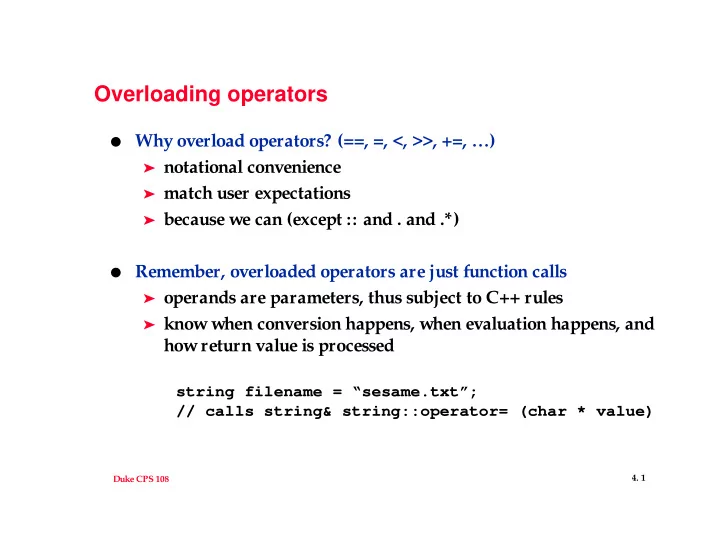

Overloading operators ● Why overload operators? (==, =, <, >>, +=, …) ➤ notational convenience ➤ match user expectations ➤ because we can (except :: and . and .*) ● Remember, overloaded operators are just function calls ➤ operands are parameters, thus subject to C++ rules ➤ know when conversion happens, when evaluation happens, and how return value is processed string filename = “sesame.txt”; // calls string& string::operator= (char * value) 4. 1 Duke CPS 108
Operator Overloading idioms ● Should you write conversion operators? ● C++ heuristic: avoid behind-the-scenes conversion ➤ CPstring v. standard string string filename=“sesame.txt”; ifstream input; input.open(filename); // CPstring input.open(filename.c_str()); // standard string ➤ vectors Vector<int> a(20); a[0] = 1; a = 2; // avoid with explicit keyword ● What else acts as a conversion operator? 4. 2 Duke CPS 108
More Operator Overloading issues ● Which operators should be member functions? ➤ some must be, some must not be ➤ only member functions can be const ● What should the type of return value be? ➤ pointer, reference, or value? ● Should you write boolean conditional operators? ➤ what about comparison operators? 4. 3 Duke CPS 108
Header files ● Angle brackets <> specify header files found in standard locations, double quotes “” specify current directory (or non standard location) ➤ <iostream.h>, <ctype.h> ➤ “ctimer.h”, “date.h” ● In new versions of C++, the .h isn’t used for standard C++ classes, e.g., <iostream>, <string>, STL <vector> ➤ on our system these files just use #include <iostream.h>, but could pre-compile or otherwise optimize the headers ➤ on other system using the .h puts classes into the global namespace, otherwise must qualify use: std::cout vs cout ● Header files are literally copied into current file! 4. 4 Duke CPS 108
Classes, compilers, dependencies #include <string> #include “day.h” typedef string TimeRange; class ostream; class Appointment { public: TimeRange duration(); void print(ostream & output); private: Day myDay; ● Why use class ostream instead of #include <stream.h> ● What is a typedef and how is it used? ● Header file defines function interfaces and size of class ➤ changes to Day force recompile for Appointment 4. 5 Duke CPS 108
.h guidelines, the preprocessor in action ● minimize #includes in every .h file ➤ avoid circular dependencies ➤ avoid re-compile by minimizing dependencies ● class Foo in foo.h, class Bar in bar.h, client foobar.cc #ifndef _FOO_H #ifndef _BAR_H #define _FOO_H #define _BAR_H #include “bar.h” #include “foo.h” class Foo class Bar { { Bar getBar(); Foo getFoo(); // from foo.cc #include “bar.h” #include “foo.h” void Foo::doStuff(const Bar & b)... ● Avoid #includes, use forward references, sometimes you must do this as shown above (even if you don’t want to) 4. 6 Duke CPS 108
#include “foo.h” ● will be needed in .cc file, e.g., foo.cc and bar.cc ● using pointers and references in .h files minimizes dependencies ➤ minimize recompiles when .h changes ➤ loose coupling: avoid implementation dependencies when possible ● avoid letting implementation leek into public view ➤ what about private section? ➤ opaque pointer: FooImpl * myImpl; • implementation of FooImpl is hidden, class can be implemented in foo.cc (handle-body idiom) ➤ factory: inheritance hierarchy, ABC 4. 7 Duke CPS 108
Recommend
More recommend